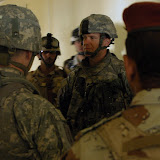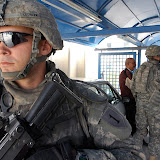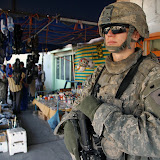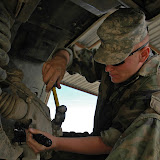‘Like a Pit Crew,’ Mechanics Keep Batteries Firing
Digital Video and Imagery Distribution
Sgt. 1st Class Robert Timmons
11.26.2007
To support Operation Iraqi Freedom all units, whether infantry, engineers, armor and even artillery, have been called on to fill non-traditional roles and hit the streets.
Such is the case with the 2nd Battalion, 32nd Field Artillery Regiment, a part of the 4th Brigade Combat Team, 1st Infantry Division back at Fort Riley where they call home, but while deployed are attached to the 2nd Brigade, 101st Airborne Division. They have traded in their howitzers for Humvees so they can mingle with the residents of Hateen and Yarmouk.
While the artillerymen walk the streets, of arguably one of the quietest neighborhoods in the city, mechanics at base camp keep the battalion’s wheels to the road.
The troopers of Company G, 610th Brigade Support Battalion, the “Proud Americans” forward support company, don’t just wait for vehicles to break down: they provide all types of support for the battalion including recovering disabled vehicles and getting them repaired for the next mission.
“It’s important here to keep the trucks on the road,” said Vero Beach, Fla., native Chief Warrant Officer Richard Jones, who heads the company’s mechanic shop. “We are here 24/7; after the mission is over and the (after action reviews) are done they bring their vehicles here to see if anything is broken.”
While the battalion had to change its focus from pounding the enemy with high-explosive shells to pounding the streets, the mechanics had to learn on the fly how to assess and fix the different style of Humvees used here.
“They didn’t have a lot of experience in these types of vehicles,” the 16 and half year Army veteran and father of three said. “But we have an outstanding bunch of mechanics here. It took time learning to troubleshoot the vehicles. The vehicles are different from that in the rear, they have different electronics and generator systems.
“It took a good 90 days for them to get used to the (M1151s) – now they are a regular pit crew.”
M1151 Humvees are the latest generation of Army vehicles which are built with heavier armor and sturdier drive trains than older models.
“The M998 Humvees we worked on at Fort Riley were a little different,” said shift supervisor Sgt. Thomas Shulte, a 29-year-old from Detroit. “They don’t have all the armor on them and it made it a lot easier. In the 1151s, a lot of stuff is packed into the work area. It’s much easier to work on once you know what you are looking for.”
Schulte, who took up fixing cars as a hobby, said the mechanics rotate between working the day shift and night shift. “There is a non-commissioned officer and several Soldiers here at night.”
During the dayshift, the Soldiers concentrate on routine servicing of vehicles, ensuring preventative maintenance checks and services are done on the trucks before they are dispatched and any other problems the trucks may have.
When doing routine maintenance, the Humvees are examined top to bottom, front to back, as the mechanics look for anything out of the ordinary.
“We make sure there is no dry rot,” Schulte said. “In these conditions the ball joints fail and tie rods bend. In this environment they fail a lot.”
Even with that challenge, Shulte and his team are proud of what they do and look forward to rejoining the rest of the Dragon Brigade once they redeploy.








